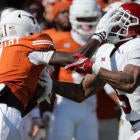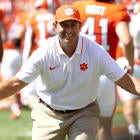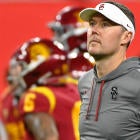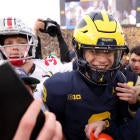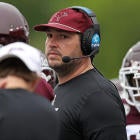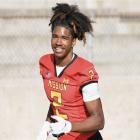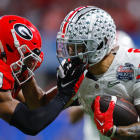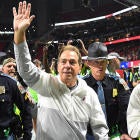
Attorney generals from Tennessee and Virginia on Tuesday filed a federal antitrust lawsuit against the NCAA challenging the legality of the association's name, image and likeness guidelines. The suit comes one day after CBS Sports reported that the University of Tennessee is dealing with an ongoing NCAA investigation into potential NIL violations involving marketing firm Spyre Sports Group.
In Tennessee and Virginia v. NCAA, the states are seeking to do away with NIL guidelines adopted by the NCAA in July 2021. Those guidelines have been modified since their initial introduction.
The suit alleges that the NCAA has violated antitrust laws by denying athletes their ability to earn full compensation for their names, images and likenesses. The plaintiffs -- including the attorneys general of Tennessee and Virginia -- may, in a matter of days, seek a temporary injunction that could suspend the NCAA's NIL rules and limitations.
The NCAA responded a few hours after the lawsuit was filed, defending its NIL guidelines in a written statement.
"While the NCAA generally does not comment on specific infractions cases, it is important to remember that NCAA member schools and conferences not only make the rules but routinely call for greater enforcement of those rules and holding violators accountable," the NCAA statement read. "In recent years, this has been especially true as it relates to establishing and enforcing a consistent set of national rules intended to manage the name, image and likeness environment.
"This legal action would exacerbate what our members themselves have frequently described as a 'wild west' atmosphere, further titling competitive imbalance among schools in neighboring states and diminishing protections for student-athletes from potential exploitation. The NCAA remains firmly committed to protecting and expanding student-athletes' NIL rights and opportunities. However, our membership has steadfastly supported the prohibition on impermissible recruiting contacts, booster involvement in recruiting prospects and the use of NIL offers as recruiting inducements."
Tennessee athletic director Danny White chimed in on with a prepared statement Thursday, making it clear the university is ready to dig its heels in and fight the NCAA on the matter.
"The NCAA generally does not comment on infractions cases because there is a rule against it; however, that has not stopped them in the past from leaking information to the media as they did this week about us," White's statement read. "Their actions made this ill-conceived investigation public and forced us to defend ourselves. It is clear that the NCAA staff does not understand what is happening at the campus level all over the country in the NIL space.
"After reviewing thousands of Tennessee coach and personnel phone records, NCAA investigators didn't find a single NIL violation, so they moved the goalpost to fit a predetermined outcome. They are stating that the nebulous, contradictory NIL guidelines (written by the NCAA not the membership) don't matter and applying the old booster bylaws to collectives. If that's the case, then 100% of the major programs in college athletics have significant violations. This is obviously silly and not productive, as is blaming the membership whenever they are challenged. We need to be spending our time and energy on solutions to better organize college athletics in the NIL era - something that NCAA leadership failed to do back in 2021. Student-athletes, prospective student-athletes, coaches, and administrators across the country deserve better, and I refuse to allow the NCAA to irrationally use Tennessee as an example for their own agenda."
Should the NCAA push back, the parties would likely go to trial; it could ultimately take years to litigate the case. However, the association certainly hopes to avoid another federal lawsuit challenging its ability to govern given the case load it is already managing.
College athletics has been in a state of confusion since those guidelines were put forth over two years ago following the Alston v. NCAA decision from the Supreme Court. Guidelines aren't rules, and rules don't apply unless they are enforced; unless enforcement changes behavior, confusion reigns.
That's where we the NCAA stands as it tries to rein in NIL excesses.
Florida State was recently penalized by the NCAA in an NIL case. Florida is currently under investigation for its recruitment of quarterback Jaden Rashada, now at Arizona State.
Considering what's at stake, this latest lawsuit could result in a possible "epic legal firefight with the NCAA," a source familiar with Tuesday's filing told CBS Sports. This is at least the third antitrust lawsuit filed against the NCAA since the beginning of November.
The association is already defending itself in two similar lawsuits that could bring down the so-called collegiate model. House v. NCAA, scheduled for 2025, could see the association on the hook for damages exceeding $4 billion in a jury trial. Johnson v. NCAA has former athletes seeking to be labeled employees for purposes of collecting back pay and damages.
In an unprecedented move two weeks ago, the Department of Justice joined a lawsuit seeking to do away with NCAA transfer rules. At the time, the DOJ said NCAA transfer restrictions are "an illegal restraint on college athletes' ability to sell their image and likeness and control their education."
In that lawsuit filed earlier this month, West Virginia AG Patrick Morrisey led a coalition of 10 states, the DOJ and District of Columbia that led to the temporary injunction suspending those NCAA transfer rules.
Due to that action, athletes are able to transfer without restriction -- at least until the end of the current semester. NCAA rules remain in place preventing athletes from playing for multiple schools in the same semester. Athletes have been able to transfer without restriction from their school or coach since 2018 when the transfer portal was established by the NCAA. Since 2021, athletes have been allowed to transfer once in their careers without any restrictions.
That same year, NIL debuted creating unprecedented athlete freedom. While coaches have complained about "free agency" in their ability to manage rosters, the NCAA has tried to defend what few guidelines exist surrounding NIL.
NCAA president Charlie Baker recently proposed even more NIL freedom suggesting schools could help arrange NIL deals with athletes. Earlier this month, the NCAA adopted further NIL guidelines.
Spyre is the sports marketing firm in Knoxville, Tennessee, believed to have signed Volunteers quarterback Nico Iamaleava to an $8 million contract (including incentives) while he was still in high school. If Spyre is found by the NCAA to be a representative of Tennessee's athletic interests, that relationship could be a violation. (It has not been confirmed that Iamaleava is the player signed to the deal; however, The Athletic in 2022 reported that an athlete had signed that $8 million contract.)
Tennessee has received a draft notice of allegations from the NCAA. That document usually precedes a formal investigation -- a notice of allegations.
Tennessee could be labeled an NCAA "repeat violator" considering it is already on probation from a June case in which it was found to have committed 18 Level I violations under former coach Jeremy Pruitt. Those violations centered around bringing in recruits during the COVID-19 dead period.
Being a repeat violator could mean enhanced penalties. However, the NCAA only applies the repeat violator label if a school lacks "exemplary cooperation."
The NCAA also has gotten away from handing out postseason bans if they impact current athletes and coaches who had nothing to do with the original violations.








